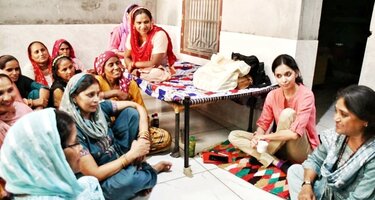Gender in CORE
Women disproportionately bear the impacts of climate change as unequal power structures and gender norms result in barriers that limit women’s ability to adapt, cope with, and recover from the impacts of climate change. At the same time unsustainable farming practices are a major source of greenhouse gas (GHG) emissions. This is particularly true for rice paddy farming, which contributes for 11 percent of Methane emissions worldwide.1
The sustainable intensification of smallholder rice farming and access to finance and markets are domains dominated by men, land ownership being a major cause of this. Only 13 percent of women own land (alone or jointly) in rural India even though they contribute a large share of labour required to manage rice farms and hence are crucial when it comes to the offsetting of GHG emissions. To increase women’s decision making power at the household level women need sustained information and exposure to the markets. Complementary, all genders need to be engaged in activities to break down discriminatory social norms, either as multiplicators or allies. Only a comprehensive approach to fight stereotypes can change the social norms and provide equality.
Against this backdrop CORE follows a gender-transformative approach to climate-sensitive rice farming, aiming to empower women as producers, entrepreneurs, and decision makers and to strengthen the recognition of women as farmers.
To this end CORE combines integrated and targeted gender interventions. Gender targeted interventions comprise leveraging the potential of women collectives (i.e. women Self-Help Groups and women-led Farmer Producer Organizations (FPOs)), strengthening business and financial skills of women entrepreneurs, qualifying women as trainers and brokers of knowledge and facilitating social change through the promotion of women role models and critically reflecting gendered social norms. In addition, gender integrated interventions include mainstreaming gender in project design, monitoring and evaluation, capacity building of consortium partners and institutionalizing gender in technical training curricula.
"Earlier even people in my own neighborhood barely knew me. Now everybody in the village knows me. It is because of the group that women can now get together and discuss their issues. Earlier women met each other only during some occasions or festivals.”
What has been achieved so far?
Right from the project onset consortium partners have agreed on a Gender Strategy as well as on a Gender Action Plan outlining key activities, deliverables, and milestones on the way to gender transformation. UN Women has played a crucial role in the capacity building of partners and institutionalizing gender, e.g. in technical training curricula.
Led by UN Women, project partners have conducted cascade trainings using a training of trainers (ToT) approach. The project targets 20,000 smallholder farmers, of which around a third have been trained on climate-sensitive/low-emission rice farming practices in Haryana, Madhya Pradesh, and Andhra Pradesh, so far, by community resource persons (CRPs), the majority of farmers and CRPs being women.
In total 5000 women farmers will be trained. In addition, the project aims to train 2,500 women farmers on leadership entrepreneurship. For this purpose, two bio-input centres collectively engaging 600 women have been established in Madhya Pradesh. Also, in Madhya Pradesh business and financial skills trainings were conducted for female directors of FPOs to learn about procurement processes with corporates such as Olam Agri. Two FPOs entered a contract with Olam Agri, enabling over 500 women to sell 463 metric tons of rice at a premium price for low-emission rice, according to project partners.
What happens next?
After establishing proof-of-concept, the project aims for the scaling-up and completion of cascade training. Also, the training of women entrepreneurs will be continued to reach a total number of 2,500 women entrepreneurs being promoted and capacitated. To reach this ambitious goal a stronger focus will be placed on collaboration with key stakeholders from government, private sector, and civil society to provide incentives and improve the ecosystem for women famers and entrepreneurs in rice value chains. From 1 September 2024, the CORE project activities will be extended to Nigeria. Lessons learned, including in relation to the gender transformative approach, will be considered in the inception phase and project implementation in Nigeria.
